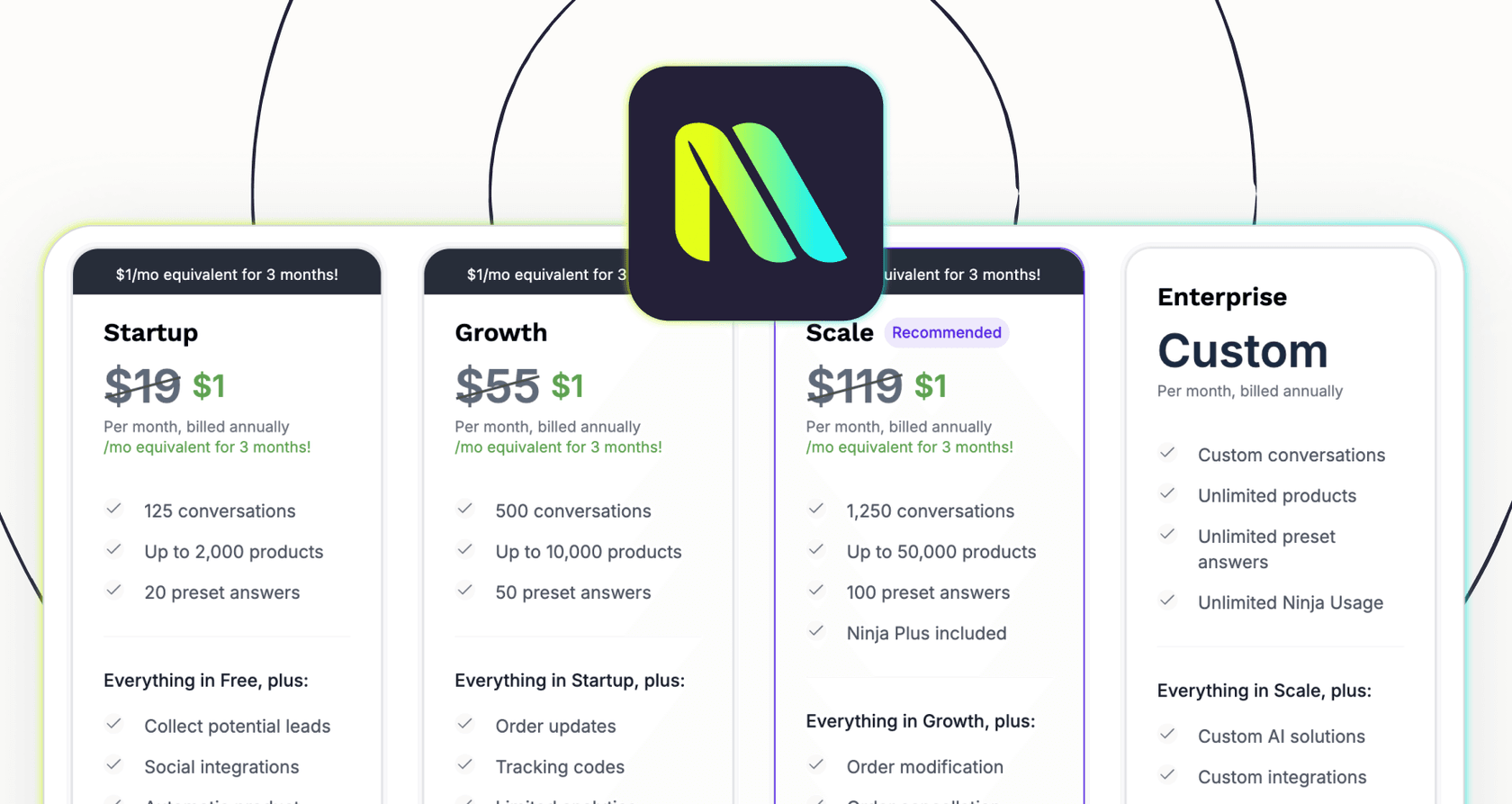
Picking the right AI chatbot for your e-commerce store feels like a huge decision, doesn't it? You need something that actually helps you sell more and support customers, but you also don’t want to get hit with surprise fees. Molin AI is one of those names that keeps popping up for online shops, promising to boost revenue and cut down on support tickets.
But when you look at their different plans and features, figuring out the real Molin AI pricing can get a little confusing. In this guide, we’re going to pull back the curtain on each plan, show you what you’re actually paying for, and point out a few important limitations you should know about. We'll also see how it stacks up against more flexible alternatives you can get running in just a few minutes.
What is Molin AI?
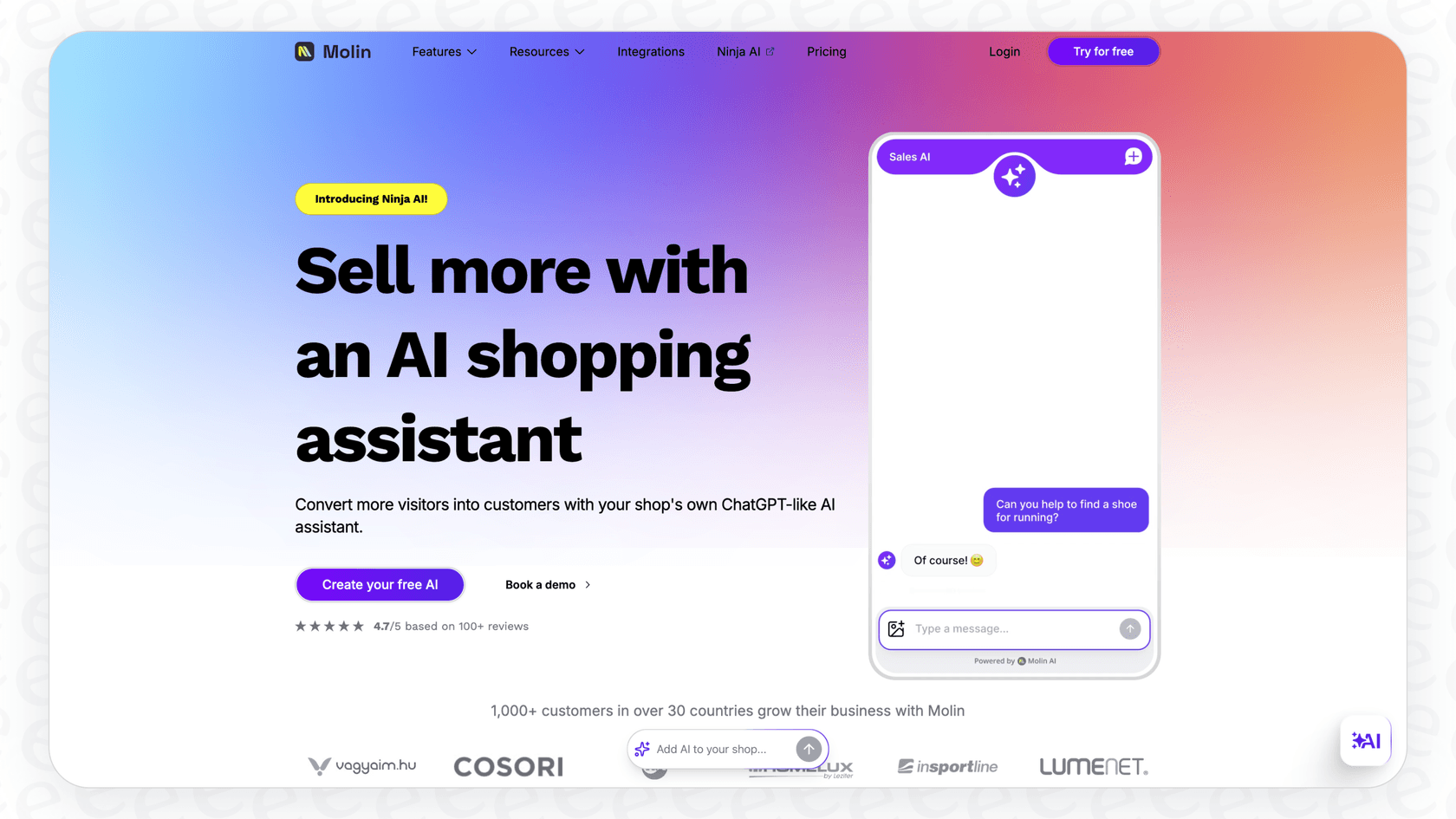
At its core, Molin AI is an AI-powered assistant built specifically for e-commerce businesses. Think of it as a ChatGPT-style shopping helper that connects with platforms like Shopify and WooCommerce to turn more of your visitors into customers.
It splits its main job into three parts:
-
Sales AI: Acts like a personal shopper, recommending products to customers based on what they ask for.
-
Support AI: Handles the usual customer questions about orders, shipping, and products, 24/7.
-
LeadGen AI: Grabs contact info from potential buyers so you can follow up later.
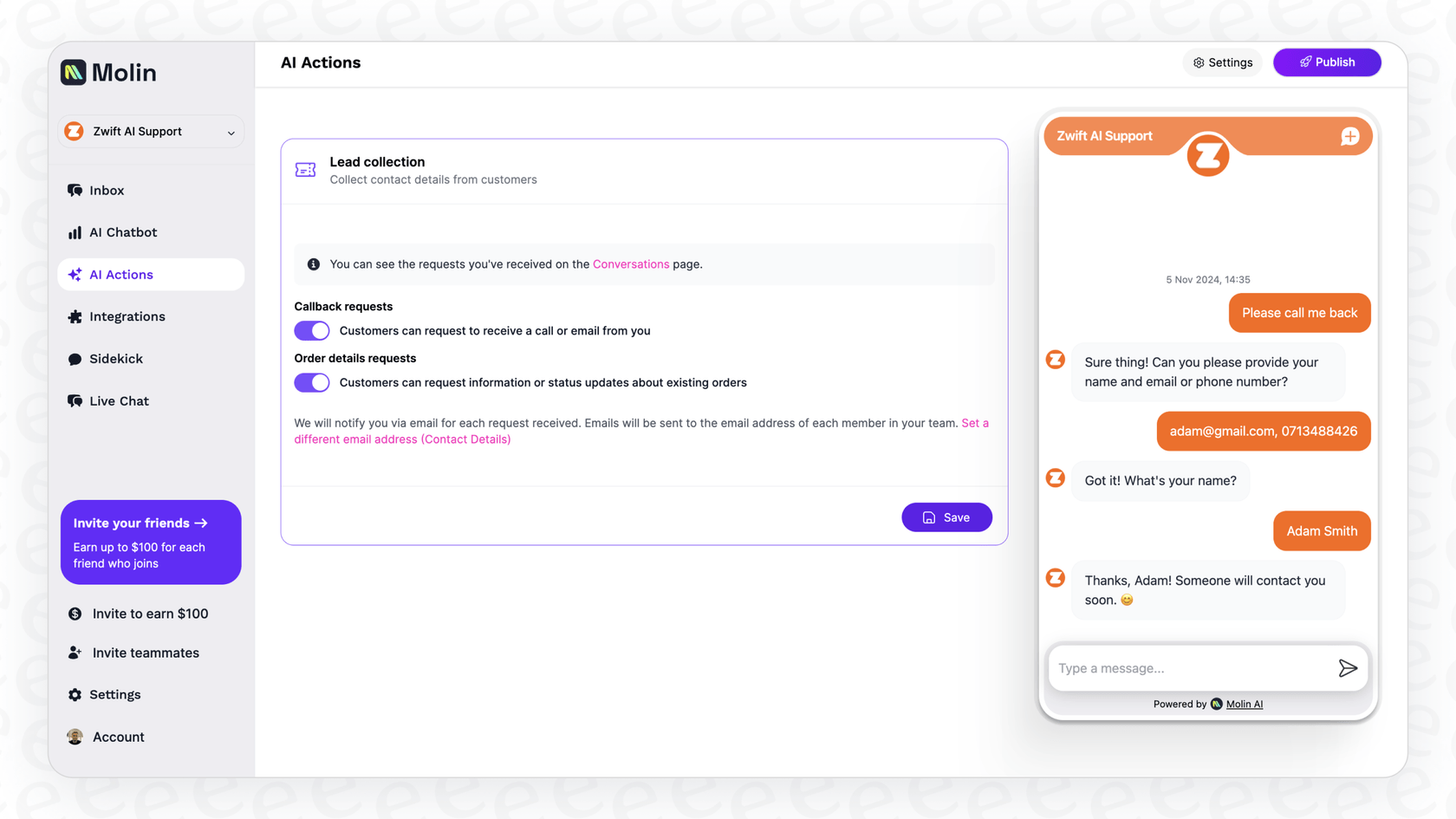
Molin AI learns from your product catalog and FAQ pages to come up with its answers. It also works in over 90 languages and can hand off conversations to a human agent if things get tricky. While it’s designed to be an all-in-one tool for online stores, its tight focus on e-commerce means it might not be the right choice if you need to automate support in other areas or for your internal teams.
Molin AI pricing plans explained
Molin AI structures its pricing around how many conversations you have each month, how many products it can learn about, and which features you can access. It's worth noting that most plans have a hard monthly conversation limit. If you hit it, the chatbot might just switch off until you upgrade.
Here’s a closer look at their plans, based on what’s on their official pricing page.
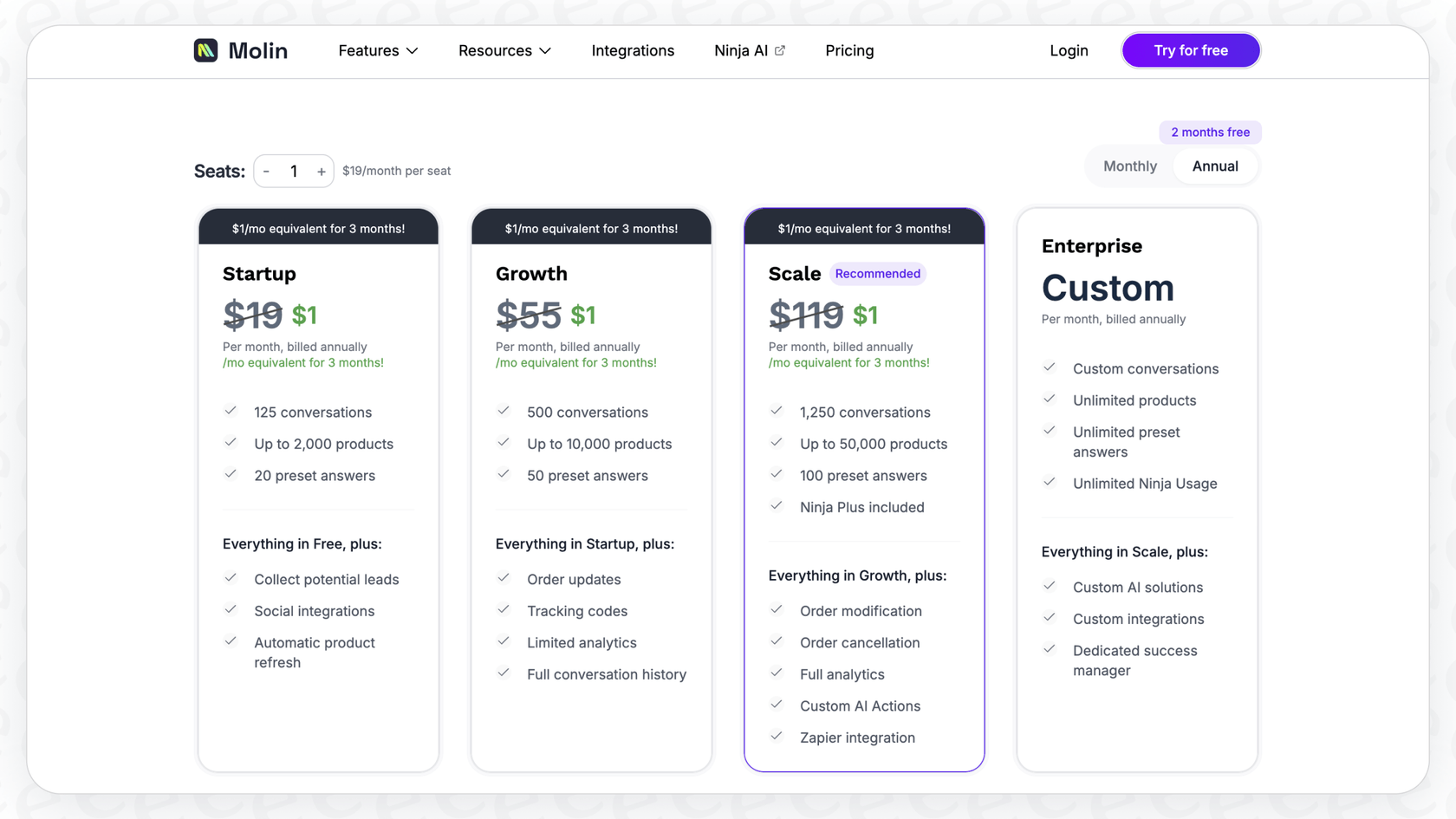
| Plan | Price (Billed Annually) | Monthly Conversations | Product Limit | Key Features |
|---|---|---|---|---|
| Free | $0 | 25 | Up to 500 | 5 preset answers, human agent transfer. |
| Startup | $19/month | 125 | Up to 2,000 | Lead collection, social integrations, 20 preset answers. |
| Growth | $55/month | 500 | Up to 10,000 | Order updates, remove Molin branding, limited analytics. |
| Scale | $119/month | 1,250 + $0.20/conv after | Up to 50,000 | Order modification/cancellation, full analytics, API access. |
| Enterprise | Custom | Custom | Unlimited | Custom integrations, dedicated success manager. |
The Startup plan
The Startup plan is the first paid step, aimed at smaller stores that are starting to see some real traffic. It gives you basic automation like lead collection and social media integrations, which is a nice bump from the free version. But with a ceiling of just 125 conversations a month, a busy store could hit that limit pretty fast.
The Growth plan
This tier is for businesses that are really starting to scale. You get some important features here, like letting customers check on their order status and tracking codes, plus you can finally remove the "Powered by Molin AI" branding. The 500-conversation limit gives you more room to breathe, but it's still a number you'll have to keep an eye on.
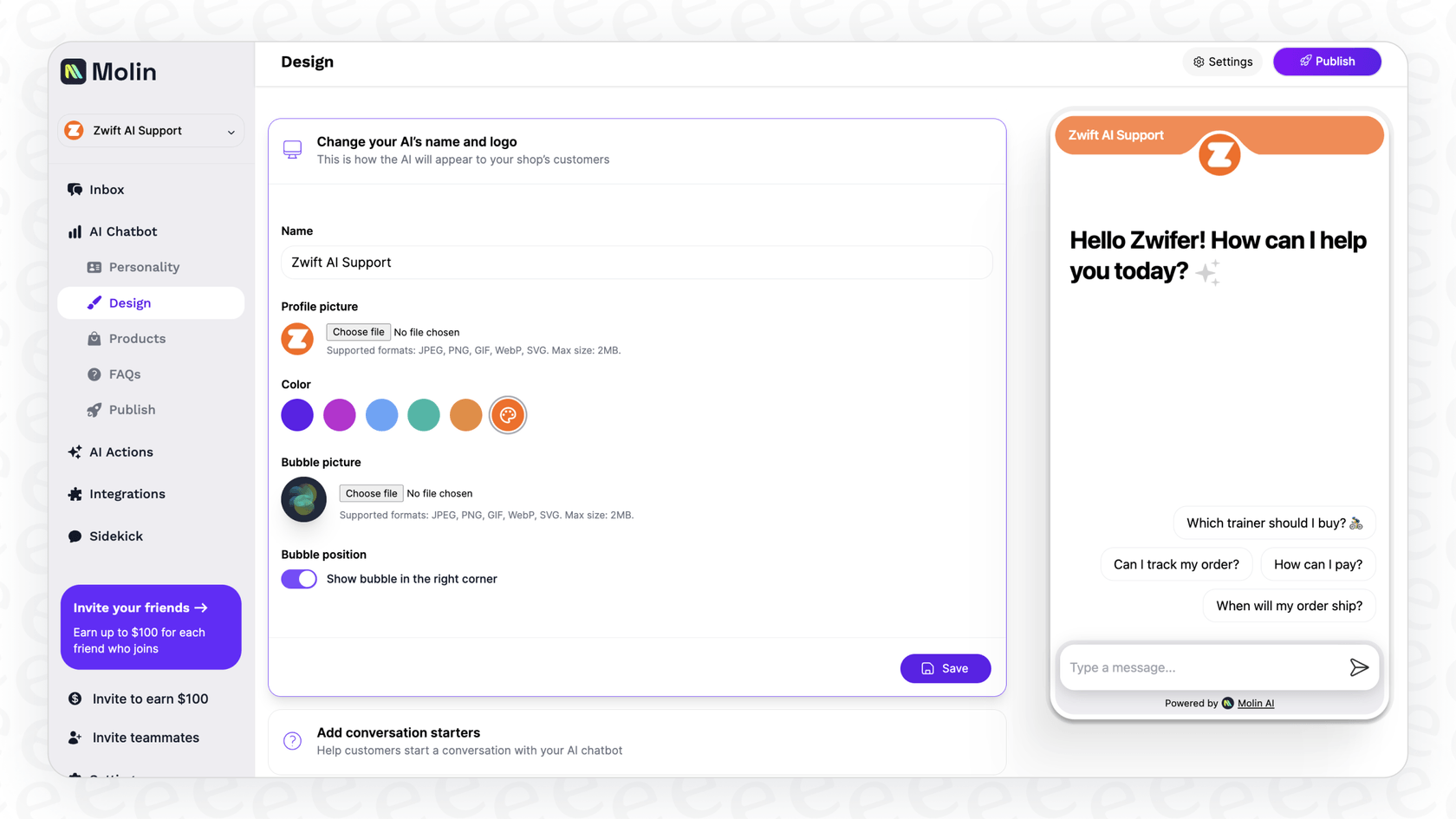
The Scale plan
The Scale plan is what Molin AI pushes for bigger operations. It unlocks all the AI Actions, including letting the bot handle order changes and cancellations. The big difference here is that you don't get shut off if you go over your limit. Instead, you start paying a per-conversation fee, which could make your monthly costs a bit of a rollercoaster.
Key features of Molin AI
Molin AI’s toolkit is almost entirely focused on e-commerce sales and answering common shopper questions. Here’s what you’re paying for.
Direct store integration
Molin AI plugs right into platforms like Shopify to learn everything about your products. This lets it act as a sales assistant, guiding customers to the right items based on what they type. It can help people find things, compare different options, and nudge them toward making a purchase.
This is great for stores, but let’s be real, where does your team actually keep its knowledge? It’s probably scattered across Google Docs, Confluence, or old support tickets. An alternative like eesel AI solves this by connecting to all your knowledge sources, not just a Shopify catalog. That means it can give complete answers for customer service, IT support, or even internal teams.

Automatic order management
On the more expensive plans, Molin AI can do things like check order statuses, send tracking links, and even process cancellations or changes. This can take a lot of repetitive work off your support agents' plates.
However, getting these custom actions set up can be a bit technical. In contrast, tools like eesel AI give you a workflow engine you can fully customize yourself, no developer needed. You decide exactly how the AI should handle different kinds of tickets and what it's allowed to do, giving you full control from the start.
Multi-language support
Molin AI can chat in over 90 languages and can even switch mid-conversation if a customer does. This is a solid feature for any brand selling internationally, as it creates a much smoother experience for shoppers around the world.
Molin AI limitations to watch out for
While Molin AI can be a useful tool for e-commerce, there are a few things to think about before you sign up.
1. The pricing model can be unpredictable
On most plans, if you go over your monthly conversation limit, the Molin AI chatbot just turns off. Imagine that happening during a Black Friday sale. Your customers are left hanging right when they need help the most. The Scale plan avoids this by charging you an overage fee ($0.20 per extra conversation), but that means you’re essentially penalized for having a successful month, and your bill becomes unpredictable.

2. A narrow e-commerce focus
Molin AI is built to do one thing: help run an online shop. If your business also needs to automate support for a software product, handle IT tickets, or give your employees an internal knowledge base in Slack, Molin AI won't be much help. Its brain is wired for product catalogs and FAQs, and not much else.
This is where a more versatile platform really pays off. eesel AI connects with help desks like Zendesk and Intercom, chat tools like Slack, and knowledge bases like Confluence and Google Docs. It becomes a single AI brain for your whole company, not just your storefront.
3. Lack of a simulation mode
From what we can see, Molin AI doesn’t offer a way to simulate how it will perform before you unleash it on your customers. You just have to flip the switch and hope it works. That's a bit of a gamble. What if it starts giving out wrong answers or can't solve simple problems?
This is a huge advantage of a tool like eesel AI, which has a powerful simulation mode. You can test your AI agent on thousands of your past support tickets to see exactly how it would have performed. This gives you a clear picture of its resolution rate and lets you tweak its settings in a safe space before any customer talks to it.

A flexible alternative: eesel AI
While Molin AI is focused on e-commerce, eesel AI is built for teams that need a powerful, flexible AI platform that just works with the tools they already use.
Here’s where it really shines:
-
Go live in minutes, not months: eesel AI is built for you to set up yourself. You can connect your help desk (like Zendesk or Freshdesk) in a single click and get your AI agent running on your own. No need to sit through a mandatory sales demo.
-
Connect all your knowledge: Don't box your AI into just a product list. eesel AI learns from your old tickets, help center articles, and internal documents in places like Confluence or Google Docs, so it always has the full story.
-
Total control and no-risk testing: Use the simulation mode to see your automation rate before you even start. When you’re ready, you can roll out the AI slowly and decide exactly which kinds of tickets it should be allowed to handle.
-
Clear and predictable pricing: Our plans are simple and based on what you need. We never charge you per resolution, so your bill won't suddenly jump just because your team had a busy month.
Is Molin AI pricing worth it?
So, what's the verdict on Molin AI pricing? For an e-commerce store with pretty straightforward needs and predictable traffic, Molin AI can be a decent starting point. The lower-tier plans are affordable, and its features are clearly designed to help online shops sell more and answer basic questions.
However, the strict conversation limits, unpredictable overage fees, and laser focus on e-commerce can be real roadblocks. For businesses that want a more powerful, adaptable, and transparent AI solution that works with all their tools and knowledge, a platform like eesel AI is a much better fit.
This video provides a walkthrough of the Molin AI chatbot creation and onboarding process, giving you a closer look at the tool in action.
Ready to see how an AI agent can change your support game without the headaches? Try eesel AI for free.
Frequently asked questions
Molin AI pricing is primarily determined by the number of monthly conversations your chatbot handles, the limit on products it can learn about, and the specific features you need. As you move up the tiers, these limits increase, and more advanced functionalities become available.
For most plans (Free, Startup, Growth), if you exceed your monthly conversation limit, the Molin AI chatbot will simply turn off until the next billing cycle. With the Scale plan, Molin AI pricing changes to an overage fee of $0.20 per conversation after the initial limit is reached, making costs less predictable.
The Molin AI pricing model and its feature set are tightly focused on e-commerce sales and support, integrating mainly with product catalogs. If your business requires AI automation for IT support, internal knowledge bases, or other non-e-commerce functions, its pricing model might not offer the best value or functionality.
The Growth tier, within Molin AI pricing, offers order updates and the option to remove Molin branding. The Scale plan, however, unlocks all AI Actions, allowing the bot to handle order modifications and cancellations, provides full analytics, and includes API access, along with a higher conversation threshold.
Molin AI pricing dictates that the option to remove the "Powered by Molin AI" branding is only available starting from the Growth plan. Lower-tier plans, like Free and Startup, will display the Molin AI branding on your chatbot.
When evaluating Molin AI pricing, be wary of the conversation limits on lower plans, which can lead to your chatbot turning off unexpectedly. On the Scale plan, watch out for the per-conversation overage fees, as these can make your monthly bill fluctuate significantly based on traffic spikes.
Share this post

Article by
Stevia Putri
Stevia Putri is a marketing generalist at eesel AI, where she helps turn powerful AI tools into stories that resonate. She’s driven by curiosity, clarity, and the human side of technology.







